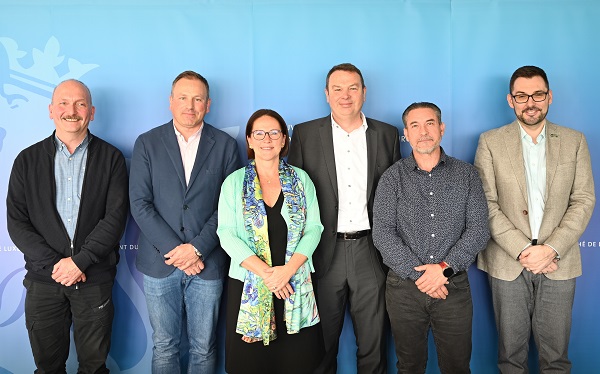 (L-R) John Blum, Goodyear; Alex Schumann, Tire Plant Luxembourg; Yuriko Backes, Luxembourg's Minister for Mobility & Public Works; René Winkin, FEDIL; Dominique Machado, LCGB-Transport; Christophe Knebeler, LCGB;
Credit: MMTP
(L-R) John Blum, Goodyear; Alex Schumann, Tire Plant Luxembourg; Yuriko Backes, Luxembourg's Minister for Mobility & Public Works; René Winkin, FEDIL; Dominique Machado, LCGB-Transport; Christophe Knebeler, LCGB;
Credit: MMTP
Luxembourg's Ministry of Mobility and Public Works has announced upcoming changes to industrial bus services within the RGTR regional bus network.
On Friday 26 April 2024, Luxembourg's Minister for Mobility and Public Works, Yuriko Backes, and representatives of FEDIL, Goodyear and LCGB agreed on the adaptation of ten of the 20 factory / industrial bus routes in accordance with the planned optimisation of RGTR routes from 7 July 2024.
The Public Transport Administration currently operates 20 industrial bus routes. The first such routes were put into service in the 1960s. The ministry described the regular public transport offer at that time as "less extensive" than today. With the reform of the RGTR network in 2021, the offer was increased by 30%, notably with longer hours, especially on weekends.
According to counts carried out at the end of 2023 / beginning of 2024, about 450 employees of various companies organised in shift work benefit from the 158 journeys carried out by the 20 industrial bus routes. As attendance on the thirteen such routes serving the Goodyear sites in Colmar-Berg and Roost in Bissen was found to be particularly low, the Mobility Minister established a working group bringing together representatives of FEDIL, Goodyear, LCGB, OGBL, the Mobility Ministry and the Public Transport Administration.
According to the ministry, the presentation of detailed analyses, data from a mobility survey of employees and the routes, timetables and connections of the RGTR routes currently available, made it possible to reach the following agreement:
- ten of these thirteen industrial bus routes (12U, 13U, 14U, 15U, 16U 21U, 90U, 92U, 93U, 94U) will be suspended, in accordance with changes to RGTR routes. Routes will be adapted from time to time and connections with the train will be made possible. In total, nine RGTR routes will be impacted by these changes from 7 July 2024, namely routes 115 (new number: 118), 119, 130, 170, 181, 191, 935, 937 and 941;
- the three other routes (70U, 91U and 95U) will be optimised in order to also serve adjacent industrial activity zones, to adapt their schedules for operation from Monday to Sunday and to integrate these routes permanently as publicly accessible routes within the RGTR network. They will be newly numbered as follows: 70U - 792; 91U - 991; 95U - 992.
With this new service concept, the share of Goodyear employees with a bus stop located less than 500 m from their home or less than 2 km to a train station to access their work (with at most one bus / train change) is expected to increase from 25% to 32%.
Minister Backes stated: "I welcome this optimisation and targeted reorganisation of several particularly lightly used factory routes. The adaptations that my ministry is making in the RGTR network, following close consultation with the social partners, will not only improve accessibility by public transport to the site in Goodyear and for employees of other employers located in the Roost [district] in Bissen, they also implement the coalition agreement in that they aim to better coordinate bus and train timetables and improve the provision of public transport in rural areas."
The aforementioned adaptations will come into force from 7 July 2024, i.e. the date of the next RGTR timetable change.
The seven industrial bus routes (10U, 20U, 40U, 50U, 60U, 61U, 80U) not taken into account in this analysis will be the subject of a separate optimisation study which will be carried out during the second half of 2024. From 7 July, these seven routes will be integrated as publicly accessible routes within the RGTR network. Their new numbers are as follows: 10U - 291; 20U - 292; 40U - 491; 50U - 591; 60U - 691; 61U - 791; 80U - 592.
Following this agreement, noted the ministry, the stakeholders expressed their desire to continue the dialogue and collaboration with the Ministry of Mobility and Public Works to promote new mobility concepts among companies and to identify and realise potential for optimising the connection of industrial activity areas to the public transport network.








